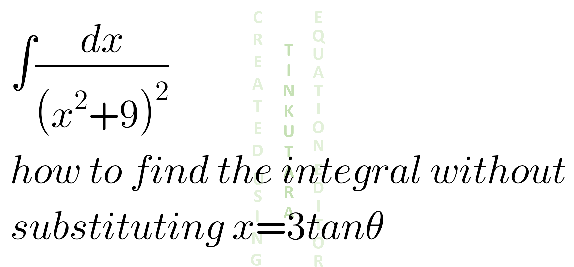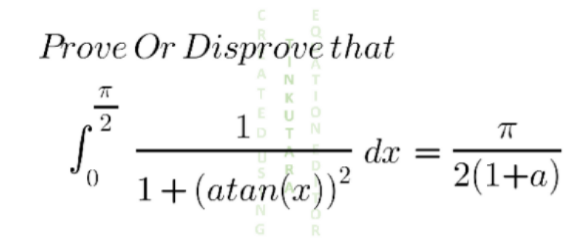
IntegrationQuestion and Answers: Page 100
Question Number 136935 Answers: 1 Comments: 0
$$\int{cos}\left({x}\right){e}^{{cos}\left({x}\right)+{sin}\left({x}\right)} {dx}=...? \\ $$
Question Number 136922 Answers: 1 Comments: 0
$$\int\:{ln}\mid{tan}^{−\mathrm{1}} {x}\mid\:{dx}\:=\:? \\ $$
Question Number 136921 Answers: 1 Comments: 0
Question Number 136906 Answers: 2 Comments: 0
Question Number 136905 Answers: 1 Comments: 0
Question Number 136929 Answers: 2 Comments: 0
Question Number 136883 Answers: 2 Comments: 0
Question Number 136868 Answers: 1 Comments: 0
Question Number 136859 Answers: 0 Comments: 0
Question Number 136858 Answers: 1 Comments: 0
Question Number 136844 Answers: 0 Comments: 0

Question Number 136840 Answers: 3 Comments: 0
Question Number 136841 Answers: 3 Comments: 0
$$\int\sqrt{{x}^{\mathrm{2}} +\mathrm{1}\:}\:{dx}\:=\:? \\ $$
Question Number 136835 Answers: 0 Comments: 0
Question Number 136813 Answers: 1 Comments: 0
Question Number 136806 Answers: 2 Comments: 0

Question Number 136803 Answers: 1 Comments: 0
Question Number 136762 Answers: 0 Comments: 0
Question Number 136750 Answers: 3 Comments: 0
Question Number 136723 Answers: 1 Comments: 0
Question Number 136680 Answers: 2 Comments: 0

Question Number 136651 Answers: 2 Comments: 0

Question Number 136644 Answers: 1 Comments: 0
Question Number 136626 Answers: 1 Comments: 0
Question Number 136572 Answers: 3 Comments: 1
Question Number 136497 Answers: 1 Comments: 2
Pg 95 Pg 96 Pg 97 Pg 98 Pg 99 Pg 100 Pg 101 Pg 102 Pg 103 Pg 104
